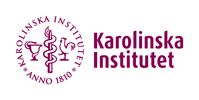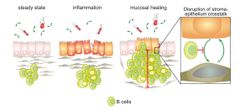Common immune cells can prevent intestinal healing
B cells are critical to the proper functioning of the immune system. However, researchers at Karolinska Institutet have shown that they can sometimes do more harm than good, as their numbers greatly increase after bowel damage, preventing the tissue from healing. The results, which are presented in the journal Immunity, can be of significance to the treatment of inflammatory bowel disease.

B cells are a type of white blood cell that have an important function in the immune system, in part by producing the antibodies that attack bacteria and viruses. Previous research has shown that people with chronic inflammatory bowel disease (IBD), such as Crohn’s disease or ulcerative colitis, have many more B cells in their intestines than healthy individuals. It has therefore been proposed that B cells might affect the severity of these diseases. Researchers at Karolinska Institutet in Sweden have now tried to discover if, and if so how, B cells contribute to IBD.
Sharp increase during healing
“We’ve been able to show that the B cell population increases sharply in the colon during the healing of colonic lesions, and that these cells mainly accumulate in areas where the damage is severe,” says principal investigator Eduardo Villablanca, associate professor at the Department of Medicine (Solna), Karolinska Institutet. “This prevents, in turn, the interaction between two other cell types – stromal and epithelial cells – which is needed for the tissue to heal.”
The researchers studied an experimental model of colitis and tissue from patients with ulcerative colitis, using a range of methods to analyse cell populations. Focusing particularly on how B cells affect healing in the intestinal mucosa, they found that mice lacking B cells recovered much more quickly after bowel damage than regular mice. The finding that the B cells seem to do more harm than good in colonic inflammation can be of significance to the treatment of IBD.
Drugs that affect B cells
“There are already approved drugs that affect the B cell response and that are used for other diseases,” says Gustavo Monasterio, postdoc in Dr Villablanca’s research group at Karolinska Institutet and one of the leading authors. “We now want to test if depleting B cells at specific time windows could also work with IBD. We also need to find out if the accumulation of B cells can have a long-term beneficial effect, such as by changing the composition of bacteria in the gastrointestinal tract.”
The study was supported by grants from the Swedish Research Council, the Swedish Cancer Society, the Knut and Alice Wallenberg Foundation (the Wallenberg Academy Fellow programme) and the German research foundation DFG. Eduardo Villablanca has received research grants from the pharmaceutical company F. Hoffmann-La Roche and co-author Camilla Engblom is scientific consultant for the biotech company 10X Genomics Inc. Julio Saez-Rodriguez receives funding from Glaxo Smith Kline and Sanofi and consultancy fees from Travere Therapeutics.
Publication: “B cell expansion hinders the stroma-epithelium regenerative crosstalk during mucosal healing”. Annika Frede, Paulo Czarnewski, Gustavo Monasterio, Kumar P. Tripathi, David A Bejarano, Ricardo O. Ramirez Flores, Chiara Sorini, Ludvig Larsson, Xinxin Luo, Laura Geerlings, Claudio Novella-Rausell, Chiara Zagami, Raoul Kuiper, Rodrigo A Morales, Francisca Castillo, Matthew Hunt, Livia Lacerda Mariano, Yue O. O. Hu, Camilla Engblom, Ana-Maria Lennon-Dumenil, Romy Mittenzwei, Nadine Hövelmeyer, Joakim Lundeberg, Julio Saez-Rodriguez, Andreas Schlitzer, Srustidhar Das, Eduardo J. Villablanca. Immunity, online 2 December 2022, doi: 10.1016/j.immuni.2022.11.002.
Contacts
For more information, please contact:
Eduardo J. Villablanca, associate professor
Department of Medicine, Solna, Karolinska Institutet, Sweden
Email: eduardo.villablanca@ki.se
Phone: +46 736 28 22 89
Images
Karolinska Institutet (https://ki.se/en) is one of the world’s leading medical universities. Our vision is to advance knowledge about life and strive towards better health for all. Karolinska Institutet accounts for the single largest share of all academic medical research conducted in Sweden and offers the country’s broadest range of education in medicine and health sciences. The Nobel Assembly at Karolinska Institutet selects the Nobel laureates in Physiology or Medicine.
Subscribe to releases from Karolinska Institutet - English
Subscribe to all the latest releases from Karolinska Institutet - English by registering your e-mail address below. You can unsubscribe at any time.
Latest releases from Karolinska Institutet - English
Using social media may impair children’s attention8.12.2025 06:01:00 CET | Press Release
Children who spend a significant amount of time on social media tend to experience a gradual decline in their ability to concentrate. This is according to a comprehensive study from Karolinska Institutet, published in Pediatrics Open Science, where researchers followed more than 8,000 children from around age 10 through age 14.
POTS common in patients with long COVID3.10.2025 11:33:37 CEST | Press Release
A new study from Karolinska Institutet in Sweden shows that an unusual heart rhythm disorder, POTS, is particularly common in people with long COVID. The majority of those affected are middle-aged women. The study is published in the scientific journal Circulation: Arrhythmia and Electrophysiology.
Simple test can predict risk of severe liver disease29.9.2025 09:00:00 CEST | Press Release
A new study from Karolinska Institutet, published in the scientific journal The BMJ, shows how a simple blood analysis can predict the risk of developing severe liver disease. The method may already start to be applied in primary care to enable the earlier detection of cirrhosis and cancer of the liver.
Press invitation: Announcement of the Nobel Prize in Physiology or Medicine 202523.9.2025 13:00:00 CEST | Press Invitation
The Nobel Prize in Physiology or Medicine 2025 will be announced on Monday October 6 at 11.30 am CEST (at the earliest).
How mutations in bodily tissues affect ageing20.8.2025 11:00:00 CEST | Pressmeddelande
Two new studies from Karolinska Institutet in Sweden have investigated how mutations that occur in muscles and blood vessels over time can affect ageing. The studies, which are published in Nature Aging, show that such mutations can reduce muscle strength and accelerate blood vessel ageing. The results can be of significance to the treatment of age-related diseases.
In our pressroom you can read all our latest releases, find our press contacts, images, documents and other relevant information about us.
Visit our pressroom

